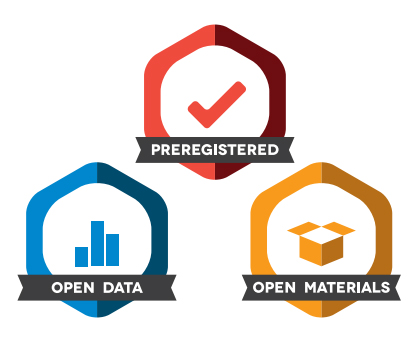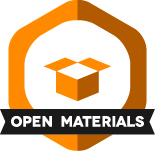Open Science Badges
**Revista Journal of Lifestyle and SDG Review Adopts Transparency Seals in Support of Open Science**
*In an exciting and progressive move towards fostering openness and transparency in scientific research, the Journal of Lifestyle and SDG Review is proud to announce its adoption of the Transparency Seals for the promotion of open science. As part of this initiative, the journal will now require authors to deposit their raw research data in the Open Science Brazil platform, contributing to the wider dissemination of knowledge and the advancement of research in diverse fields.*
The journal's decision to embrace the Transparency Seals is a testament to its commitment to promoting best practices in scientific research and empowering researchers to make their work more accessible to the global community. By aligning with the principles put forth by the Center for Open Science (COS), the Journal of Lifestyle and SDG Review seeks to play an active role in driving a culture of openness, integrity, and collaboration within the academic and research community.
**Open Science Brazil: A Gateway to Share Knowledge**
The Open Science Brazil platform (eISSN: 2764-9822) will serve as the repository for all raw research data associated with articles published in the Journal of Lifestyle and SDG Review. This robust and secure platform is designed to facilitate seamless data sharing, allowing researchers to upload and store their data in a manner that ensures data integrity and accessibility.
The adoption of Open Science Brazil as the designated repository not only enhances the visibility of research but also facilitates replication and validation of findings, strengthening the credibility and reliability of scientific outcomes. With data openly available, scholars, policymakers, and the public will have the opportunity to delve deeper into the research, accelerating progress in the pursuit of sustainable development goals and improving lifestyle practices.
**Three Badges of Open Science Practices**
To further incentivize and reward authors for their dedication to open science, the Journal of Lifestyle and SDG Review offers the opportunity to apply for one or more of the three badges that signify adherence to open science practices in research. These badges, recognized globally, symbolize a commitment to openness, transparency, and the principles of reproducibility. The badges available include:
1. **Open Data Badge:** Awarded to researchers who share their raw research data openly on the Open Science Brazil platform, promoting transparency and enabling data-driven exploration.
2. **Open Methods Badge:** Acknowledging authors who openly detail their methodologies, ensuring the reproducibility of research protocols and facilitating further investigation.
3. **Preregistered Badge:** Granted to researchers who preregister their study designs and analysis plans, reducing bias and increasing the credibility of research outcomes.
By providing authors with the opportunity to earn these prestigious badges, the Journal of Lifestyle and SDG Review aims to incentivize the adoption of open science practices and foster a culture of openness that benefits the entire scientific community.
*In conclusion, the Journal of Lifestyle and SDG Review's embrace of Transparency Seals and its partnership with Open Science Brazil exemplify its dedication to advancing scientific knowledge through open and collaborative means. By supporting the initiative of the Center for Open Science and offering badges that commend open science practices, the journal solidifies its position as a champion for transparency, integrity, and progress in research. Together, with the collective efforts of researchers, readers, and policymakers, we can propel scientific research to new heights, paving the way for a better and more sustainable future for all.*
The purpose of the Open Science Badges is to promote and acknowledge practices that adhere to openness, a core value of scientific practice. The badges are incentives for researchers to share data, materials, or indicate that the data analysis plan and/or design was preregistered. The badges indicate to readers that the materials or data are publicly available in perpetuity.
More detailed information is available about the Open Sciences Badges Program.

This journal supports the three current badges in the Open Sciences Program. To apply for the badge authors must complete the open practices disclosure form and return it to a member of the editorial team. The editorial team will then determine if the submission meets the criteria to qualify for a badge. An author may apply for one or all three of the available badges.

The Open Data badge is awarded when digitally-shareable data necessary to reproduce the reported results are publicly available.

The Open Materials badge is earned by making publicly available the components of the research methodology needed to reproduce the reported procedure and analysis.

The Preregistered badge is earned for having a preregistered design.
For more information see the Open Sciences Badges Program or contact one of the editors.










